Staff Inquiry: Eternally Watchable Movies
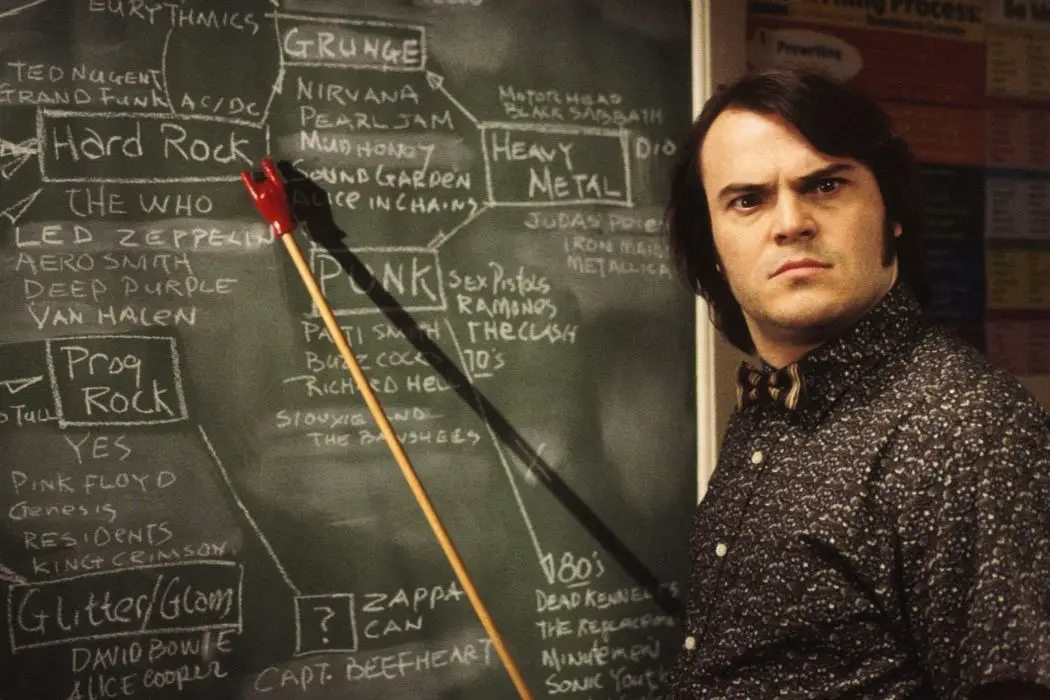
Alex is a film addict, TV aficionado, and book lover.…
Experiencing a movie for the first time is a joy, and so is experiencing it for the 100th time. Some movies can be watched over and over, never falling out of favor and always delivering exactly what we need. There’s comfort in known entities, and a movie you can recite word for word, beat for beat is a special kind of comfort.
What draws us back, though, is a reflection of personal taste, so when we asked our writers which movies they can watch until the end of time, we got the usual massive range of responses. So here they are, the films our staff find eternally watchable.
Andrew Young – When Harry Met Sally… (1989)
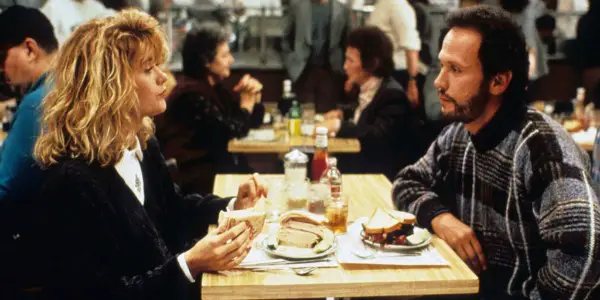
Film history is littered with throwaway romantic comedies. Whilst the genre often provides the immediate satisfaction of a warm and fuzzy tale of love and optimism, few rom-coms could be considered essential viewing. Some, however, hit the balance of substance and frothy entertainment so well that there is very little else that could be considered ‘eternally watchable’. Chief among these high-end rom-coms, and perhaps the greatest example of the genre every made, is When Harry Met Sally…
I first saw the film as a young teen when my parents showed it to me, as it was one of the few films they both loved. I loved it too. Years later, I still rewatch it and am still just as enamoured with it as ever. That’s the magic of the perfect romantic comedy, you see; it is utterly timeless and merits rewatch after rewatch, because of its undying belief in love.
The reason Nora Ephron and Rob Reiner’s creation is so watchable is that it achieves the rare feat of being a romantic comedy that is both genuinely funny and genuinely romantic. Billy Crystal and Meg Ryan opposites-attract leads are so perfectly matched, sparking off each other with such wit when they play friends, and somehow seeming made for each other when they finally get together. Spending time with these characters is 90 minutes of joy no matter how many times I do it, and that final scene will always be one I hold dear.
I once sat in a restaurant and heard the woman next to me ask for the salad without the chilis and the dressing on the side. It’s no surprise what immediately came to mind. At least she didn’t remind me of the other restaurant scene.
Tynan Yanaga – The Princess Bride (1987)
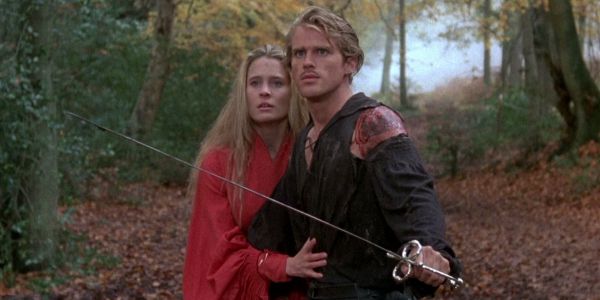
I find myself gravitating to a certain William Goldman-penned, Rob Reiner-directed adventure-comedy-drama-romance because it hits all the marks for a truly bona fide repeat classic. Namely, an inexhaustible lineup of quotable quips, which everyone knows is an immediate indicator of rewatchability quotient. (Roll selected sound byte now.)
Still, levity aside, as the grandfather – an incomparable Peter Falk – boasts to his grandson (an equally skeptical Fred Savage), it’s got “fencing, fighting, torture, revenge, giants, monsters, chases, escapes, true love, miracles” and that can only describe The Princess Bride as well as a list of actions can.
If we are to take our inquiry quite literally, fairy tales are about as primordial and eternal as we can possibly get. It’s part of the enduring charm of the movie, capable of courting so many different audiences all at the same time while tapping into the deepest longings of our hearts.
Because when Grandpa was growing up, “television was called books” and books gleaned their origins from folk lore and fairy tales. Humanity is drawn to their rapturous happy endings because, again, they satiate something dwelling deep inside of us. I am reminded of JRR Tolkien’s essay where he writes, “It is not difficult to imagine the peculiar excitement and joy that one would feel, if any specially beautiful fairy-story were found to be primarily true.”
Love will not go unrequited. Good will best evil. And the hero will ride off into the sunset with his princess bride. The grandson is visibly repulsed by the kissing and somehow still wants more.
We rewatch movies like these because, on an elemental level, we want them to be true; and they instill a belief that maybe this type of life can be attainable for us, even if we have trouble believing it. Somehow, we’re all like that little boy. It’s a brilliant piece of storytelling.
Emily Wheeler – Upstream Color (2013)
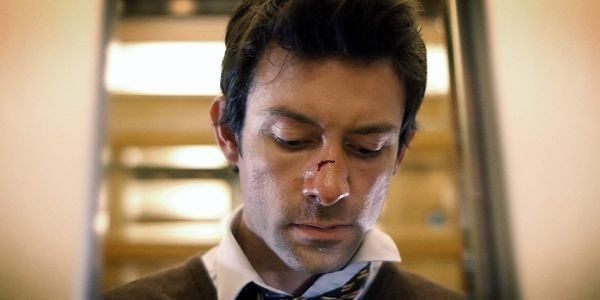
A movie that is purposefully impossible to understand can never get old, right?
The tale of two people trying to piece their lives back together after a bizarre robbery may be more serious than most of the films people rewatch constantly, but Upstream Color is a comforting movie to me because I hate being fed bullshit.
You want to comfort me? Then tell me that life is hard and confusing and that we’ll never completely understand it, and then tell me that that’s okay. Sometimes I need to be reminded that other people feel lost, too, and Upstream Color is, if anything, about being lost and the comfort of finding people who will be lost with you.
Andrew Stover – Sing Street (2016)
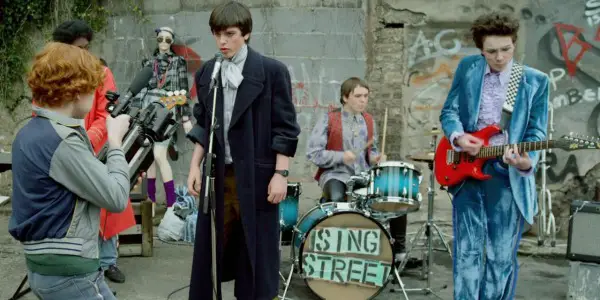
When you’re young, you scavenge for purpose in a world that’s as unpredictable and euphoric as it is harsh and unforgiving. John Carney’s Sing Street is an infectious coming-of-age tale taking place in 1985 Dublin. It follows a 14-year-old boy named Connor (Ferdia Walsh-Peelo) who is growing increasingly annoyed with his parents’ careworn relationship. And because of money troubles, Connor is transferred to an inner-city, all-boys Catholic public school, filled with virulent classmates and scathing teachers.
It isn’t until the alluring and cryptic Raphina (Lucy Boynton) catches Connor’s eye, and beguiled by her presence, Connor invites her to star in his band’s music videos. From there, Connor forms a “futurist” band, meshing the innovative sounds of ‘80s music (Duran Duran, The Cure and The Clash) and the garish ‘80s demeanor. It all started with the girl, but the joy that comes from creation, music, and youth is something to be cherished.
I openly cherish Sing Street for all of its sincerity, music, and optimism. Not only are the bandmates funny (Eamon and his bunny) and lovestruck teens, but they also help perpetuate the elation that comes from creating something, and sharing in this creation without wrangling over money. When you’re younger, it seems like there are endless possibilities.
Sing Street already won me over with its ‘80s-inspired soundtrack (all of the catchy lyrics coexist to a foot-tapping beat), but the ethereal ending cautiously measures the beauty of dreams, while also implying the heartache of them as well. When Connor and Raphina are (metaphorically) sailing across the sea to London, there’s a rightfully fearful and hopeful feeling about their future. But at the end of the day, drive it like you stole it.
Sing Street boasts an aura of a creamy daydream that may end up in pieces, but the journey is still contagiously gleeful. Already juggling the impact of music and youth, the bond of brotherhood is another element that easily warms my heart. No matter how many times I watch Sing Street, the music, the cast, and the relationships (Connor and Raphina, Connor and his brother, the bandmates’ rollicking banter) nails every beat and strums every heartstring.
Lana Stanczak – Singin’ in the Rain (1952)
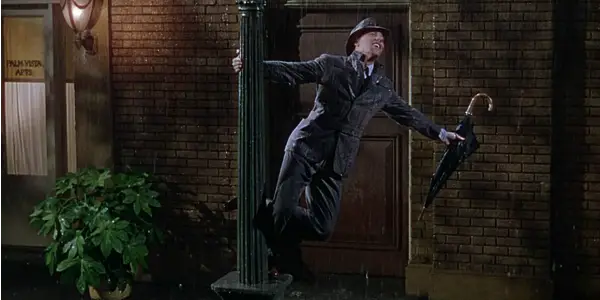
When I was probably younger than 5 years old, my mother blessed me and my sister by introducing us to the world of movie musicals. From The Sound of Music to Hello Dolly! to Grease (which we watched way too young), we saw them all. While I still love many of these movies I grew up on, there’s one that stands out above the rest: Singin’ In The Rain. At age 19, I love the movie even more than I used to.
Singin’ In The Rain was released in 1952, directed and choreographed by Stanley Donen and Gene Kelly. Kelly also starred in the film along with Debbie Reynolds and Donald O’Connor. Set in the late 1920s, the film follows three performers as they try to navigate the transition from silent films to talkies.
What makes Singin’ In The Rain a rewatchable movie? Everything. Because everything about this movie is perfect. Even among a soundtrack that includes the iconic title track, “Good Morning,” and “Make ‘Em Laugh,” there are no forgettable or weak songs. Even the 6+ minute dream ballet that has nothing to do with the actual plot feels completely necessary.
The sets built for this movie are absolutely stunning, along with the costumes. The performances of the three leads create characters that are wildly entertaining and endearing. The dancing in this movie is so technically spot on that you find yourself watching Kelly’s feet more than his face. Overall, the movie is romantic, fun, and something anyone of any age can enjoy. Even if you don’t like musicals, this one will sweep you off your feet and might even get you to sign up for a tap class.
Linsey Satterthwaite – Little Miss Sunshine (2006)
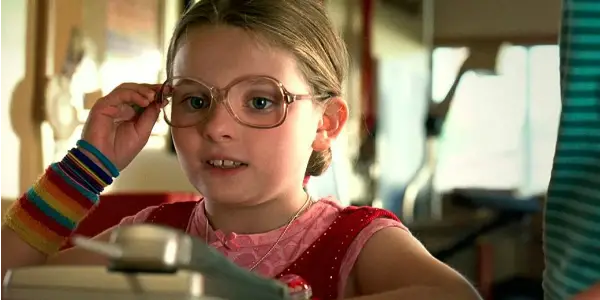
When life is getting a bit too much, there is one film I always go back to, that I can watch time and time again. My rainy days and Mondays watch is Little Miss Sunshine; for me, it is the film equivalent of wrapping a huge blanket around myself and achieving warm fuzzies.
That’s not to say that the film is a happy-fest and without its bumpy moments. As the Hoover family travel in their rusty yellow VW campervan to get daughter Olive to her Little Miss Sunshine pageant, they bicker, fight, and face an unexpected death en route.
Paul Dano’s morose Dwayne himself points out that the family is made up of suicidal, bankrupt, and divorced members, so how does this film manage to cheer me up with every watch? It is because despite all the narrative rocky roads and character flaws, they come together when they need each other most, and they also put the fun in dysfunctional.
Little Miss Sunshine makes me feel that no matter what, your loved ones will stick with you, a tried and tested sentiment but one that you sometimes need to remember when the walls are closing in and everything feels slightly darker. It also contains one of my favourite Steve Carrell performances and the scene where he breaks into a run to get Olive to the pageant before the deadline is something I could watch for days and days.
So, whenever the blues start forming, I pop on this film and by the end of their journey, and mine, the clouds have parted, and I have rediscovered my own little piece of sunshine.
Melody Danielle Rice – School of Rock (2003)
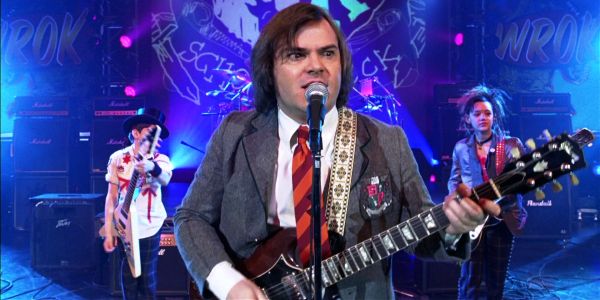
Rockism is a tough sell, but Jack Black, writer Mike White, and director Richard Linklater manage to make it seem appealing in this infectious film about the joy of loving music. Analyze it too much and you’ll find plenty of holes. In a way, the film is about a man who cons a school into giving him a classroom of child laborers so he can start a small business, with the ending proving that people don’t care about ethical production if the end product is good.
But on a less subtextual level, it’s just a film about a man who loves rock and roll and who teaches some kids to love it as well. Black is in perfect form, and the kid actors all turn in good performances as well. It’s funny, moving, and just purely entertaining, comfort food filmmaking at its best.
Plus, the soundtrack rules, combining classic rock radio favorites like AC/DC, Cream, and even Led Zeppelin (who are notoriously stingy about the rights to their songs) with punk rock legends like The Clash, Ramones, and The Modern Lovers. And the song “School of Rock” itself, written (in the film) by the band’s guitarist Zack, is a jam in its own right.
Lewis Punton – Star Wars: Episode III – Revenge of the Sith (2005)
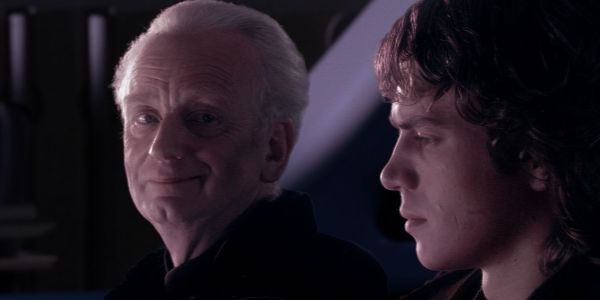
Nothing screams confidence quite like an attempted rant on why the CG-heavy, planet-hopping Star Wars prequels rule, so in a slightly more controlled yell let’s momentarily dissect the returning qualities of its third installment, Episode III: Revenge of the Sith.
With an absurd amount of bows to tie in its closing chapter, the third Star Wars prequel spent roughly 150 minutes etching what apparently exists as the most quotable script in cinematic history onto the brain of this particular audience member, simultaneously ingraining pop-culturally dominant iconography into the psyche of a generation that were confidently acknowledging Ewan McGregor’s Obi-Wan Kenobi as a genuine hero.
Whilst some characters found themselves coughing their way through insanely dynamic confrontations (General Grievous violently reporting for duty, sir), others spent what might be some of the most thrilling moments of lightsaber history slashing their way through a concussive, brotherly duel on Mustafar, an experience that continues to instantly widen eyes over a decade later.
As scenes pass and the inevitable fall to the dark side lands on screen, performances far and wide seem to elevate wildly, causing a welcome shift in tone that elevates tension, interest, and a certain Chancellor’s constant scene-stealing power, all adding to this galactic installment’s returning magnetism.
Revenge of the Sith might not be, objectively speaking, the strongest Star Wars adventure in terms of storytelling quality, but this saga has always felt incredibly subjective in modern-day discussion, existing in differing degrees of poignance to different people, making it incredibly difficult to objectively comment on. However, that being said, it seems we can all agree that Palpatine did, in fact, possess, as he so boldly states, unlimited power.
Maria Lattila – Moulin Rouge! (2001)
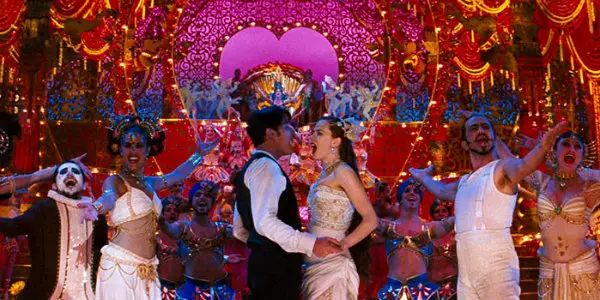
Baz Luhrmann’s musical extravaganza Moulin Rouge! came out when I was about 10 years old. I received a VHS copy from my relatives and completely fell in love with its over-the-top representation of all those bohemian values, however shallow they might now seem.
The film was shiny and sparkly, but I always valued its melancholy heart the most. It was the very end when Christian ugly-cries (because we all ugly-cry) that got to me. It wasn’t a single tear down his cheek, but full-on wailing after the love of his life died in his arms. It was beautiful and sad and everything a pre-teen me needed in her life.
That VHS tape had the magical power of turning my bedroom into a magical world of music, dance, big skirts and heartache. This is where my love for musicals began; the sheer sense of utopia the film was able to provide for me was priceless and certainly helped me through my teenage years.
I kept going back to that old VHS tape, I would watch it several times a day if no one stopped me, and eventually, the colours went a bit funny. Yellow and green lines appeared on screen and eventually it went completely static. I cried so hard, but thankfully DVDs had already become a thing so I was soon watching it again. And again. And again, to this day.
Watching Moulin Rouge! today, the film might be a little dated, but Luhrmann absolutely nails the spectacle. Dance numbers are thrilling and sexy, the emotional moments still hit because Ewan McGregor and Nicole Kidman can pull pretty much anything off with ease. It’s a film that’s easy to hate, but much easier to love unconditionally.
Jacqui Griffin – Independence Day (1996)
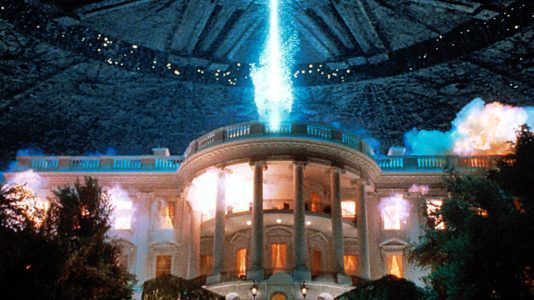
I was 9 years old in 1996. I grew up in a relatively small town just outside of Philadelphia. These two factors led to one, almost inescapable, reality – I was a huge fan of Will Smith. I would pop reruns of The Fresh Prince of Bel-Air on and watch with my friends, and we’d all pretend we knew what it meant to be born and raised in West Philadelphia because, in our minds, we practically were.
So, when Independence Day came out, the star power of Smith combined with a general affinity for anything space-themed (Space Jam came out the same year and was equally massive) resulted in all of us seeing Independence Day, bizarrely abbreviated to “ID4”.
As children, we enjoyed the action, Will Smith’s sarcasm and disrespect towards authority figures, and of course, the aliens. As I grew up, watching the film at least yearly since it usually came on television for the Fourth of July, I began to discover that I loved other aspects of it, and I became an earlier worshipper in the cult of Goldblum, whose awkward mannerisms and wry intelligence began to speak to me in my teenage years.
To this day, I can repeat back almost every line of the film, with all its cheese, and of course there’s “the speech” by Bill Pullman. I, for one, don’t believe you’ve really celebrated the Fourth of July unless you at least read it. To be certain, the meaning of those words seems to resonate with me today, especially given the nature of the current political climate. “Mankind, that word should have new meaning for all of us today. We can’t be consumed by our petty differences anymore. We will be united in our common interests.”
Zoe Crombie – Hot Fuzz (2007)
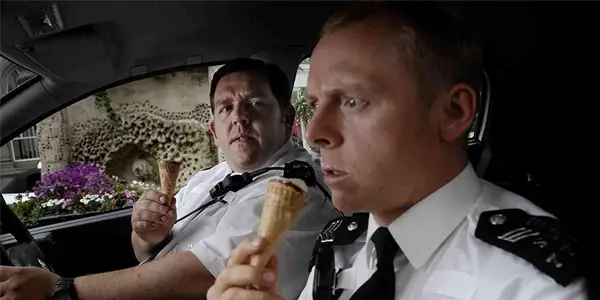
Comedies logically shouldn’t come into play as often as they do when discussing rewatchable films. After all, surely a joke can only be funny so many times? But for some inexplicable reason, movies like Wayne’s World, Austin Powers, and my choice for this collaboration, Hot Fuzz, have likely been watched by me and my family members 50+ times, and I’d happily watch them 50 times more.
No doubt assisted by the endless reruns on ITV2, Hot Fuzz has become a quotable mainstay in my life even twelve years after it was first released into the world. In case you aren’t from England and therefore aren’t afforded it on TV every day, the film follows the driven, career-minded Sargeant Nicholas Angel as he is relocated from crime-filled London to the sleepy West country town of Sandford – except all is not what it seems.
Perhaps it’s partially because of my rural English upbringing, but I find a strangely relatable joy in much of what goes on in the film, particularly as the nuances of living in a small town are so rarely explored in big-budget movies. Watching Angel’s confusion at how everyone knows everyone and how flowerbeds and fairs are considered newsworthy always makes me chuckle.
But beyond this personal connection, the layers upon layers of jokes in this film, both in the script and through Edgar Wright’s famously sharp editing, are what keeps bringing me back. You have the more obvious running gags like ‘yarp’ and ‘the greater good’ that were endlessly repeated in playgrounds and classrooms for years to come, but I and many others only noticed subtler jokes like the twin Bill Baileys with their books and the farmer’s mum actually ‘packing’ long after.
Add in the fact that many of these moments are filtered through the charisma and chemistry of Simon Pegg and Nick Frost, and you have a comedic masterpiece on your hands – one that can hold up through endless repeat viewings.
Those are some of the movies we can watch eternally. What are yours? Let us know in the comments below!
Does content like this matter to you?
Become a Member and support film journalism. Unlock access to all of Film Inquiry`s great articles. Join a community of like-minded readers who are passionate about cinema - get access to our private members Network, give back to independent filmmakers, and more.
Alex is a film addict, TV aficionado, and book lover. He's perfecting his cat dad energy.













